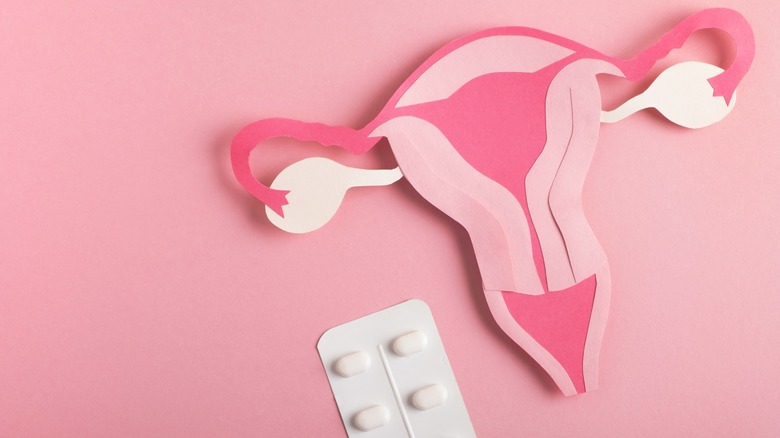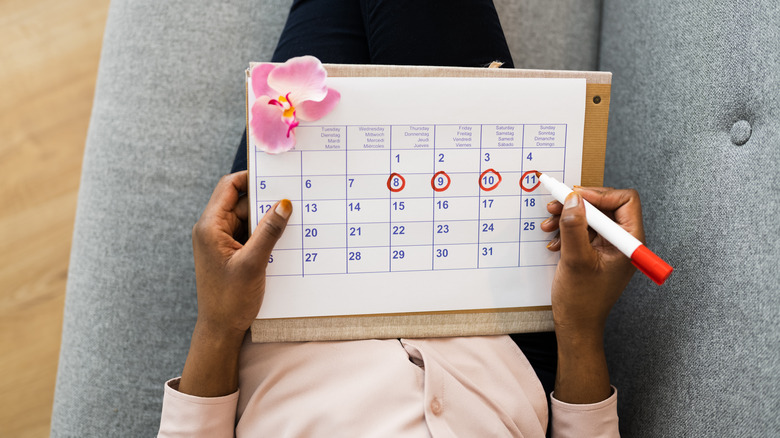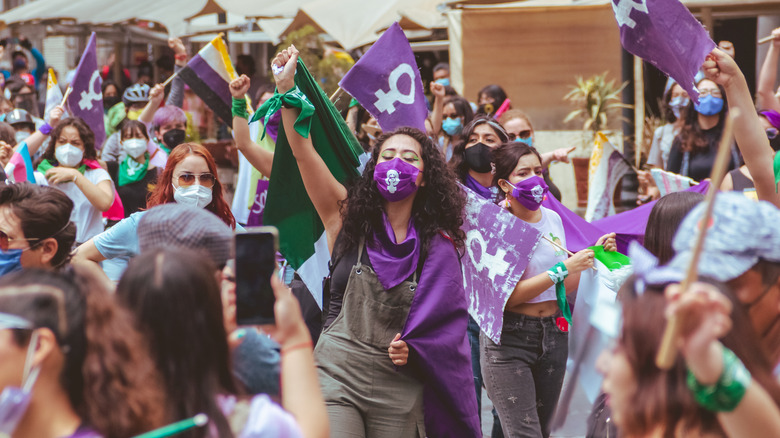Everything You Need To Know About Free Bleeding
If you're a person who menstruates, then you might have stumbled across the term free bleeding before. Because there continues to be a stigma around periods, you might be hesitant to ask for clarification about this period term. As explained by the International Planned Parenthood Foundation, period censure is something that has allowed harmful misconceptions and misinformation about menstruating to thrive, as the conversation around women's health and periods has been suppressed.
According to Clue, taboos around periods became a part of different cultures separately, though scholars offer different answers for when these harmful beliefs first arose. It's also important to note that not all societies believed that periods are bad, as some historical documents, such as medical texts from ancient Eygpt, suggest positive associations with menstruation (via Clue). Today, some cultures celebrate periods, such as the Mbendjele tribe of Central Africa, who believe it is a special process blessed by the moon.
Even though a select number of communities value and accept menstruation, the shame and misinformation around periods is something that can be traced as far back as the Old Testament of the Judeo-Christian bible, which suggested that the biological process was unclean (per PDXScholar). This is an idea that has carried on into modern conversations and continues to negatively impact those who menstruate.
In defiance of this taboo, it's important for any period person to be aware of their menstruation options, including the choice to free bleed.
Free bleeding is exactly what it sounds like
To fully understand the decision to free bleed, you first need to know its basic premise. According to Healthline, the practice is exactly what it sounds like: an individual menstruating without the use of traditional period products, such as tampons or pads. Whether or not products like period underwear count as free bleeding may differ depending on who you ask, with some considering it as a method for transitioning from traditional period products to free bleeding (per Women's Health).
There are no proven health benefits to free bleeding, although some people report an improvement in their period cramps. Free bleeding is generally believed to be sanitary, as mentioned by Healthline, but some medical professionals warn against this practice because of the potential viruses that can generally live in the blood (per Healthline). As a result, they emphasize the additional cleaning measures that would need to be taken if someone free bled in a public space.
If you're considering free bleeding, you'll also want to think about the logistics of potentially leaking through several sets of clothes, as this is likely to happen on heavier flow days. With these cons in mind, you might be wondering why anyone would choose to free bleed, but there are many factors that can go into this personal period decision.
There are many reasons to choose free bleeding
Free bleeding is associated with a larger, feminist movement (per Flo). In this way, the decision to free bleed can be motivated by various factors. As Clue explains, the heart of the free bleeding movement strives to normalize menstruation and reduce the stigma around period blood. Another reason why someone would choose to free bleed is to raise awareness about period poverty. According to a BMC Women's Health study, those who suffer from period poverty are unable to access the menstrual products, clean facilities, and health resources needed to respond to menstruation. This can result in individuals using unhygienic methods of absorbing period blood or being forced to miss school or work.
Similarly, free bleeding may be used to oppose the tampon tax, which is the additional sales tax applied to period products because they are not considered essential items by the government (per Global Citizen). Those who choose to free bleed might be motivated by the environmental impact of period product waste. While you may not have considered your period practices unsustainable, Leaf Score reports that North America sends 20 billion pieces of period products, such as tampons, applicators, and pads to landfills each year.
Lastly, free bleeding can be a decision based on personal liberation, as many people report feeling freed from the shame and stigma of menstruating after trying out this period practice.


